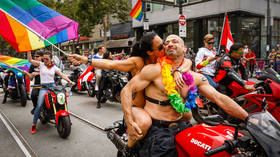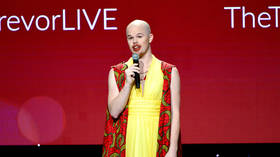Record number of Americans identify as LGBTQ

The number of adult Americans who identify as something other than heterosexual has risen to a record 7.1%, a new Gallup phone survey revealed on Thursday.
The metric has more than doubled since 2012, the first year the company started tracking such data. Then, 3.5% of respondents who volunteered their sexual orientation and/or gender identity said they were part of the LGBTQ community.
The increase reflects a wider relevance of such identities among younger generations, the polling agency said. Among GenZs, or people born between 1997 and 2003, 20.8% of people identified as LGBTQ. For comparison, only 2.6% of Baby Boomers, born between 1946 and 1964, responded that way.
Millennials (born 1981-1996, in Gallup’s terms) were the second-largest age group in terms of LGBTQ representation, but were also among the least likely to name their identity. Some 7.1% declined to answer that question, on par with people born before 1949. Among GenZs, only 3.5% didn’t want to divulge this information.
Most of the growth in LGBTQ identification was among GenZ and Millenials, with the percentage of such people among older generations remaining stable over the years. For GenZ, it doubled since 2017, when the metric stood at 10.5%. Over the years, a greater portion of the generation reached adulthood and became eligible for Gallup’s poll, it noted.
More than half of LGBTQ Americans, or 56.8%, said they were bisexual. Among GenZ, over 72% of non-heterosexuals identified as bi. Gays, lesbians, and transgender people constitute 20.7%, 13.9% and 10% of the overall community, with the remaining 4% going to the “something other” category.
“These young adults are coming of age, including coming to terms with their sexuality or gender identity, at a time when Americans increasingly accept gays, lesbians and transgender people, and LGBT individuals enjoy increasing legal protection against discrimination,” Gallup said, commenting on its study.
Last year, an online survey conducted in 27 countries by Ipsos said 11% of adults in the US identified their sexual orientation as something other than heterosexual, while 13% said they were only, mostly, or equally attracted to same sex.














